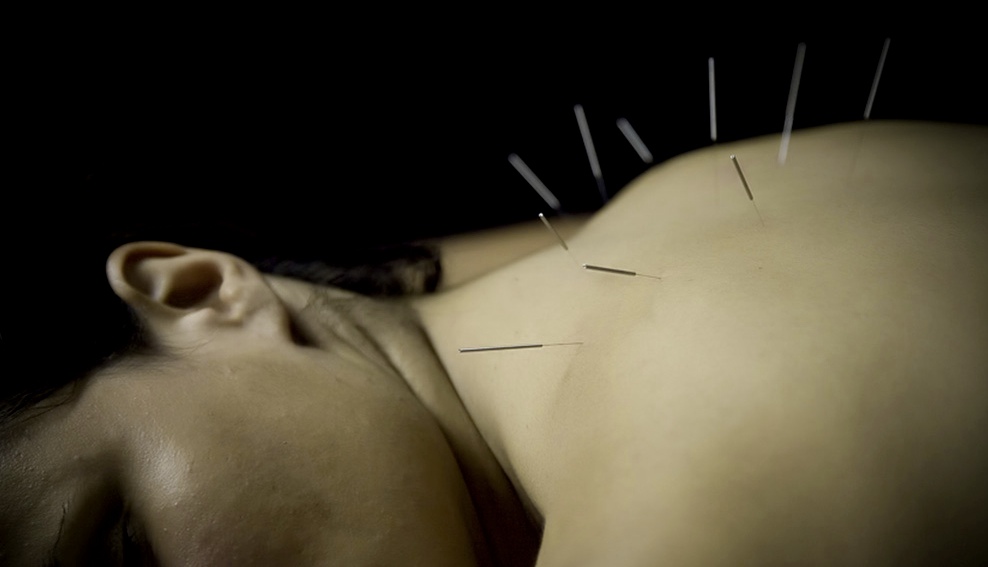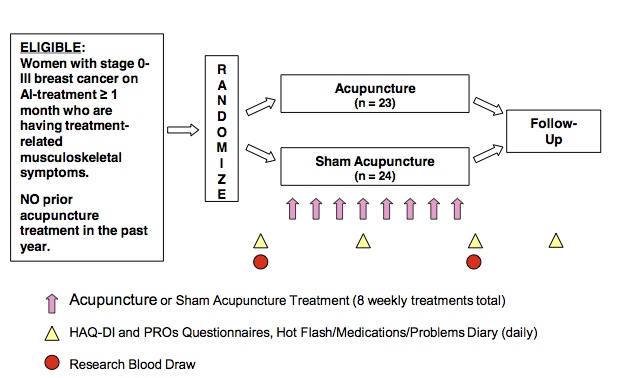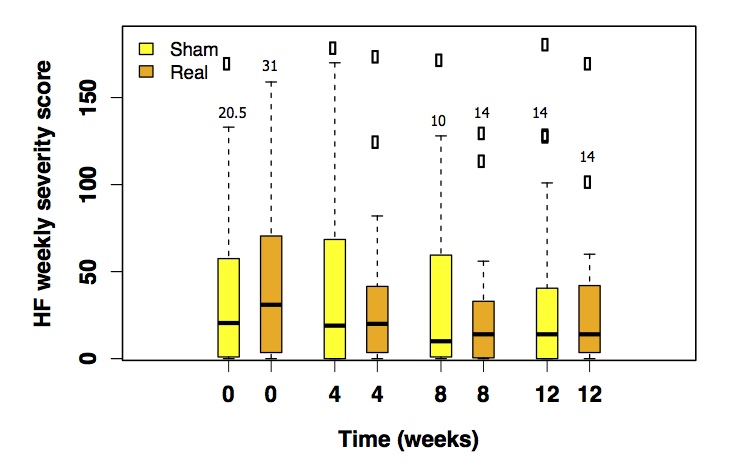Acupuncture is a popular alternative medicine treatment, often used for very subjective symptoms - pain and general malaise. The only way of measuring if a treatment works is "patient reported outcomes" - i.e. what the patient feels about changes in their symptoms, so it's very susceptible to the placebo effect - where the patient thinks they feel better just because they have received a treatment that they think works.

With drugs it's fairly easy easy to test for the placebo effect by giving one group of patients in a study a harmless pill. If there's no way the patient can tell if they got the drug or the placebo, then any difference between the placebo group and the drug group will be due to the effects of the drug.
With acupuncture though, this is more difficult. It's quite hard to devise a fake needle. It's difficult to convince a patient that they have had a needle stuck in them when they actually did not. So most acupuncture studies compare the effects of "real" acupuncture against the effects of no treatment at all, or against some treatment that the patient can tell is not the real thing. So the placebo effect could be all that's happening. People could simply be feeling better because they think they got "real" acupuncture.
So a new study published in the journal Cancer is particularly interesting, as the researchers devised a way around this. They created a fake non-penetrating needle, which they applied to random points on the body, whereas the "real" group received traditional acupuncture with penetrating needles.

The result: both groups reported improvement! There was no statistical difference between the sham and the real treatments.

So clearly the inserting of needles, and the the placement of needles is unimportant to the eventual result. So what's actual going on? It seems to be one of:
It's interesting how this has been reported though. Most reports are along the lines of "acupuncture is a pseudoscience", yet on a nursing forum the results of the study were reported with the bold headline: "How acupuncture helps breast cancer patients".
http://blog.staffnurse.com/2013/12/24/how-acupuncture-helps-breast-cancer-patients/
It's difficult to argue with that, after all if something makes someone feel better, then why not do it? That fact that the needles are not actually doing anything does not ultimately detract from the fact that people feel better after having the needles stuck in them. It might rankle the skeptic, but even the author of the study says that there's no real downside in trying it, as it might work for you - even if it's just placebo.
But the really interesting thing for science here is to try to understand why the placebo effect works. Hopefully when we can understand that we can treat the symptoms more directly and efficiently, without resorting to meaningless rituals of stabbing people with needles, just to make them think they have been treated.

With drugs it's fairly easy easy to test for the placebo effect by giving one group of patients in a study a harmless pill. If there's no way the patient can tell if they got the drug or the placebo, then any difference between the placebo group and the drug group will be due to the effects of the drug.
With acupuncture though, this is more difficult. It's quite hard to devise a fake needle. It's difficult to convince a patient that they have had a needle stuck in them when they actually did not. So most acupuncture studies compare the effects of "real" acupuncture against the effects of no treatment at all, or against some treatment that the patient can tell is not the real thing. So the placebo effect could be all that's happening. People could simply be feeling better because they think they got "real" acupuncture.
So a new study published in the journal Cancer is particularly interesting, as the researchers devised a way around this. They created a fake non-penetrating needle, which they applied to random points on the body, whereas the "real" group received traditional acupuncture with penetrating needles.

The result: both groups reported improvement! There was no statistical difference between the sham and the real treatments.

So clearly the inserting of needles, and the the placement of needles is unimportant to the eventual result. So what's actual going on? It seems to be one of:
- Simply thinking you are being treated is sufficient to improve your symptoms, or
- The physical process of laying down, being touched, and relaxing for a while helps your symptoms.
It's interesting how this has been reported though. Most reports are along the lines of "acupuncture is a pseudoscience", yet on a nursing forum the results of the study were reported with the bold headline: "How acupuncture helps breast cancer patients".
http://blog.staffnurse.com/2013/12/24/how-acupuncture-helps-breast-cancer-patients/
The takeaway here is that acupuncture "works", even if it's only the placebo effect, and hence it's still a useful treatment.December 24 - Women undergoing breast cancer may benefit from acupuncture to help relieve the side-effects of treatment, researchers have reported. The acupuncture does not need to be genuine – but the patient needs to believe it is acupuncture, researchers said. In the study, reported in the journal Cancer, acupuncture was used to relieve women suffering from joint and muscle pain and stiffness and hot flushes. The acupuncture itself caused no side-effects.
It's difficult to argue with that, after all if something makes someone feel better, then why not do it? That fact that the needles are not actually doing anything does not ultimately detract from the fact that people feel better after having the needles stuck in them. It might rankle the skeptic, but even the author of the study says that there's no real downside in trying it, as it might work for you - even if it's just placebo.
But the really interesting thing for science here is to try to understand why the placebo effect works. Hopefully when we can understand that we can treat the symptoms more directly and efficiently, without resorting to meaningless rituals of stabbing people with needles, just to make them think they have been treated.
Last edited:
